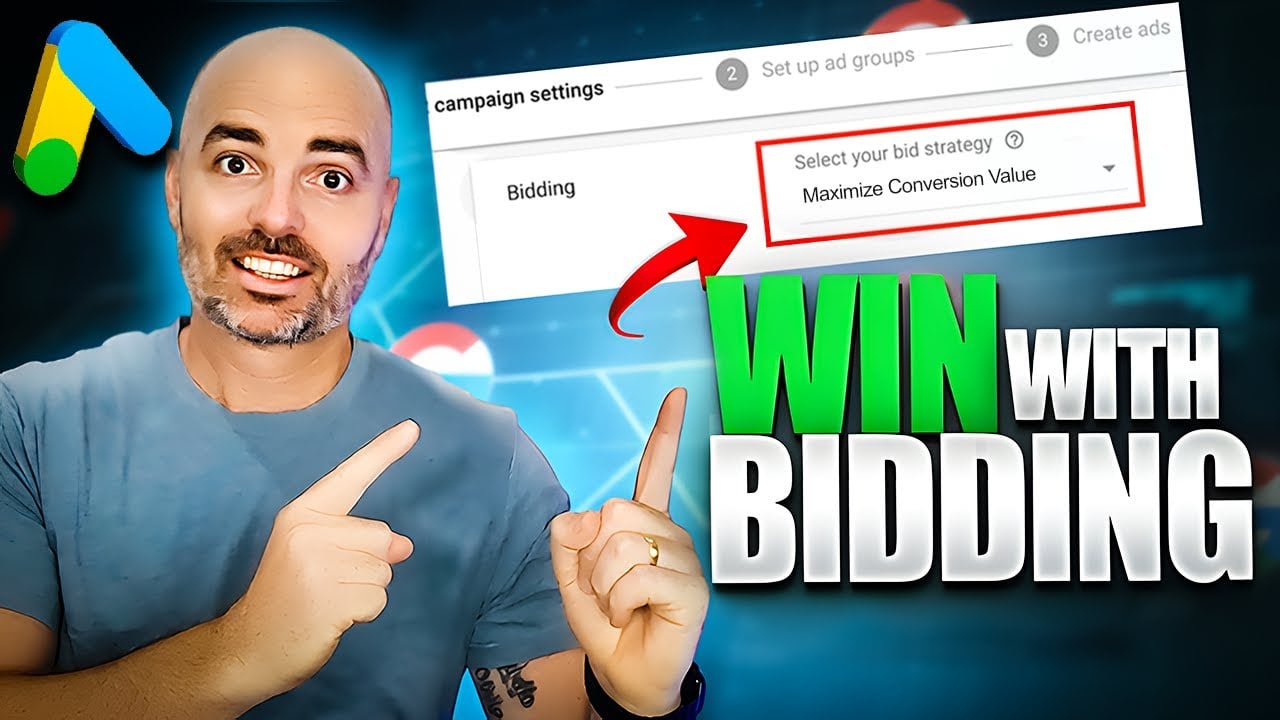- keyword bidding strategy
- Understanding Keyword Bidding Strategy
- Importance Of Google Ads In SEM Campaigns
- Factors Determining Ad Rankings
- Manual Keyword Bidding For Better Money Usage
- Utilizing Google Keyword Planner For Starting Bids
- Leveraging Automated Bidding Strategies With Historical Data
- Exploring Different CPC Bidding Strategies
- Targeting Specific Goals With Advanced Bidding Strategies
In the fast-paced world of online advertising, every marketer knows the importance of grabbing the spotlight amidst a sea of competition. And when it comes to search advertising, mastering the art of keywordbiddingstrategy can mean the difference between success and getting lost in the digital abyss.
Imagine having the power to strategically position your ad at the top of search engine results, targeting the right audience, and maximizing your return on investment. Keywordbidding is the secret weapon that unlocks these possibilities.
So, buckle up and get ready to dive into the world of keywordbidding, where the right strategy can catapult your brand to new heights.
| Item | Details |
|---|---|
| Topic | Unlocking Success: Keyword Bidding Strategy Secrets Revealed |
| Category | Ads |
| Key takeaway | In the fast-paced world of online advertising, every marketer knows the importance of grabbing the spotlight amidst a sea of competition. |
| Last updated | December 28, 2025 |
keyword bidding strategy
A keyword bidding strategy refers to the approach taken in search advertising to determine how much to bid on keywords. It is an important aspect of search engine marketing (SEM) campaigns as it directly impacts the visibility and effectiveness of ads.
A popular platform for SEM campaigns is Google Ads, where factors like cost per click (CPC) bid and quality score determine ad rankings. There are different strategies available for keyword bidding, and the choice depends on campaign goals and available data.
Manual bidding allows advertisers to have better control and understanding of how their advertising money is being used. Google’s Keyword Planner tool helps in selecting keywords and suggests starting bids.
However, automated bidding strategies are recommended when historical data is available. Various bidding strategies are available, such as CPC bidding, Enhanced Cost Per Click (ECPC) bidding, Target Cost Per Acquisition (CPA) bidding, Target Return on Ad Spend (ROAS) bidding, Target Search Page Location bidding, Target Outranking Share bidding, Cost Per View (CPV) bidding, CPM bidding, Maximize Conversions bidding, and Portfolio Strategy.
Ultimately, the success of a keyword bidding strategy relies on aligning it with campaign goals and continually monitoring and optimizing it for the best results.
Key Points:
- Keyword bidding strategy determines how much to bid on keywords in search advertising.
- It impacts the visibility and effectiveness of ads in search engine marketing campaigns.
- Manual bidding provides control and understanding of advertising spend, with Google’s Keyword Planner tool for selecting keywords.
- Automated bidding strategies are recommended when historical data is available.
- Different bidding strategies are available, including CPC bidding, ECPC bidding, CPA bidding, ROAS bidding, and more.
- Success relies on aligning the strategy with campaign goals and continually monitoring and optimizing it.
Sources
https://www.fool.com/the-ascent/small-business/articles/keyword-bidding/
https://www.spiralytics.com/blog/keyword-bidding-strategies-adwords/
https://directiveconsulting.com/blog/google-ads-bidding-strategies/
https://www.woculus.com/keyword-bidding-101-everything-you-need-to-know/
Check this out:
💡 Pro Tips:
1. Use negative keywords: Incorporating negative keywords in your keyword bidding strategy can help eliminate irrelevant clicks and optimize your campaign’s performance. By excluding keywords that are unrelated to your products or services, you can attract more relevant traffic and improve your ad’s click-through rate.
2. Segment your keywords: Grouping your keywords into specific ad groups allows for more targeted bidding. By organizing keywords based on relevancy or specific product categories, you can bid more effectively and tailor your ad copy to specific user intents.
3. Monitor and adjust bidding regularly: Keep a close eye on your campaign’s performance and adjust your bidding strategy accordingly. Continuously monitor your ad’s position, click-through rate, and conversion rate, and make necessary adjustments to maximize ROI and stay competitive.
4. Conduct A/B testing: Experiment with different bid amounts and analyze the results to find the optimal bidding strategy. Test variations such as higher or lower bids, different time intervals, or ad scheduling to determine which approach generates the best results for your campaign.
5. Consider competitor targeting: If you want to outperform your competitors, consider using a targeted outranking share bidding strategy. This tactic allows you to bid on specific competitor websites, ensuring that your ad appears above theirs in search results. It can help increase brand visibility and potentially steal market share from your competitors.
Understanding Keyword Bidding Strategy
Keyword bidding is a crucial aspect of search advertising that can greatly impact the success of your SEM campaigns. It involves placing bids on keywords that potential customers might search for, with the goal of having your advertisements appear prominently in search engine results.
By effectively bidding on keywords, you can increase your website’s visibility, drive targeted traffic, and ultimately achieve your advertising goals.
Importance Of Google Ads In SEM Campaigns
When it comes to SEM campaigns, Google Ads is undoubtedly the most popular and widely used platform. With Google Ads, you can create and manage your search advertising campaigns, have control over your budget, and reach a vast audience of potential customers.
Google Ads provides various tools and features to optimize your campaigns, allowing you to maximize the return on your investment.
Factors Determining Ad Rankings
The ranking of your ads in search engine results is influenced by various factors, including your CPC bid and quality score. CPC, or Cost Per Click, bid represents the maximum amount you’re willing to pay for each click on your ad.
A higher bid typically leads to a higher ad position. Quality score, on the other hand, measures the relevance and quality of your ads, keywords, and landing pages.
It considers factors such as expected click-through rate, ad relevance, and landing page experience. By optimizing your CPC bids and improving your quality score, you can improve the visibility and effectiveness of your ads.
Manual Keyword Bidding For Better Money Usage
While automated bidding strategies can be effective, manual keyword bidding allows for a deeper understanding of how your advertising money is being used. By manually setting bids, you have more control and visibility over the bidding process.
This enables you to make strategic decisions based on your budget, goals, and performance data. Manual bidding requires ongoing monitoring and adjustment to ensure optimal results, but the insights gained can be invaluable for optimizing your SEM campaigns.
Utilizing Google Keyword Planner For Starting Bids
The Google Keyword Planner tool is a powerful resource for selecting keywords and determining starting bids. It provides insights into search volume, competition, and suggested bids for specific keywords.
By using this tool, you can identify relevant keywords with high search volume and set appropriate starting bids. The Keyword Planner helps you make informed decisions about which keywords to target and how much to invest in your advertising campaigns.
Leveraging Automated Bidding Strategies With Historical Data
Automated bidding strategies are recommended when you have sufficient historical data available. Google Ads offers various automated bidding strategies that utilize machine learning algorithms to optimize your bids in real-time.
These strategies take into account factors such as conversion data, device type, location, and time of day to adjust bids and maximize campaign performance. By leveraging automated bidding, you can save time, increase efficiency, and potentially achieve better results based on data-driven insights.
Exploring Different CPC Bidding Strategies
CPC bidding is a common and straightforward strategy for generating website traffic. With CPC bidding, you pay for each click on your ad, regardless of whether it leads to a conversion.
It is a cost-effective way to drive targeted traffic and increase brand exposure. Enhanced Cost Per Click (ECPC) bidding takes CPC bidding a step further by automatically adjusting your bids to maximize conversions while still generating traffic.
ECPC bidding can help you achieve a balance between cost-efficiency and conversion goals.
Targeting Specific Goals With Advanced Bidding Strategies
For advertisers with specific conversion goals, advanced bidding strategies offer tailored approaches to achieve desired outcomes. Target Cost Per Acquisition (CPA) bidding sets a target amount for every click, aiming to reach conversion goals within a specified budget.
Target Return on Ad Spend (ROAS) focuses on achieving a specific sales amount by optimizing bids based on the expected return on investment. Target Search Page Location bidding increases brand awareness by bidding for top positions on search engine result pages.
Target Outranking Share bidding allows you to outperform competitors by bidding to show your ads above specific websites. These advanced strategies enable advertisers to align their bidding with specific goals and measure success accordingly.
In conclusion, keyword bidding strategy plays a crucial role in the success of your SEM campaigns. Understanding the various bidding strategies, leveraging available tools, and setting clear goals can help you unlock the full potential of your advertising efforts.
Whether you opt for manual bidding or utilize automated strategies, the key is to continuously monitor and optimize your campaigns to achieve maximum results. With a well-planned and executed keyword bidding strategy, you can effectively reach your target audience, drive website traffic, and achieve your advertising goals.











